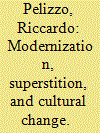|
|
|
Sort Order |
|
|
|
Items / Page
|
|
|
|
|
|
|
| Srl | Item |
| 1 |
ID:
120988


|
|
|
|
|
| Publication |
2013.
|
| Summary/Abstract |
An account of the time which the author spent among the Iban more than 30 years ago. He describes the customs, festivals and way of life of a people who were still headhunters in recent memory. More particularly he explains how people who lived in longhouses the way their ancestors had lived were slowly brought to change their traditional beliefs, thus enabling development to take place.
|
|
|
|
|
|
|
|
|
|
|
|
|
|
|
|
| 2 |
ID:
193264


|
|
|
|
|
| Summary/Abstract |
This World Affairs 2023 special issue contains six contributions, including this one, exploring some of the key political consequences of traditional beliefs such as magic and superstition in the developing societies of the Global South as well as in certain industrially advanced societies of the Global North. To show why traditional beliefs matter, we provide an explanation in this introduction for why traditional beliefs exist in developing countries, why they survive in developed countries, and why they may become more popular over time. By utilizing a simple game theoretic approach, we explain why rational people can sometimes increase their payoffs by subscribing to a superstition while superstitious people never gain by switching to rationality. In fact, the superstition—which has no causal connection with the natural course of events—may even yield better results, not only for the individual but also for the group. This is the reason why, in the framework of evolutionary stable equilibrium, superstitious people can demographically dominate an entire population over time. In addition to explaining the existence and the persistence (or the popularity) of traditional beliefs, we highlight the key findings presented in the articles included in this special issue. All of them underline a cardinal point: traditional beliefs matter. They shape electoral behavior, they shape attitudes toward democratic governance, and they influence voters’ assessment of political figures and historical events. Precisely because traditional beliefs have such extensive implications for a country's political life, we believe that in the future scholars will have to pay greater attention to such beliefs to have a better understanding of political phenomena and trends.
|
|
|
|
|
|
|
|
|
|
|
|
|
|
|
|
| 3 |
ID:
193265


|
|
|
|
|
| Summary/Abstract |
By exploring the relationship between socioeconomic development, secularism, and the pervasiveness of traditional beliefs, this article shows that while some traditional practices and beliefs, such as making use of traditional healers, are negatively and significantly related to several development indicators, there is little to no detectable (statistical) relationship between other traditional beliefs and practices, such as believing in and seeing a jinn, and development. The evidence presented in the article sustains the claim, advanced at the turn of the millennium by Inglehart and Baker, that the impact of socioeconomic development on values, attitudes, and cultural change is complex and non-linear.
|
|
|
|
|
|
|
|
|
|
|
|
|
|
|
|
| 4 |
ID:
193267


|
|
|
|
|
| Summary/Abstract |
The party system literature has generally paid little attention to whether traditional beliefs have any impact on voters’ electoral behavior and the stability of party systems. The purpose of the present study shows that the stability of party systems and the pervasiveness of traditional beliefs go hand-in-hand. This article is expected to advance the scholarly understanding of the political consequences of traditional beliefs by showing that voters who hold traditional beliefs or engage in traditional practices are not simply less likely to have pro-democratic attitudes or have a greater appreciation of dictatorial rule, but also more likely to vote for ruling parties in elections. The evidence presented in the article sustains a basic claim; namely, that the pervasiveness of traditional beliefs in Togolese society should be regarded as one of the determinants of the party system's stability.
|
|
|
|
|
|
|
|
|
|
|
|
|
|
|
|
| 5 |
ID:
193268


|
|
|
|
|
| Summary/Abstract |
The new modernization theory has suggested that the pervasiveness of traditional values has a clear impact on the quality of democratic governance. In this contribution to this special issue on the political consequences of traditional beliefs, we explore whether and to what extent the pervasiveness of traditional values and beliefs has a detectable impact on authoritarian attitudes. Specifically, we analyze the relationship between the support for a “strongman” and the acceptability of traditional practices for Muslim respondents from 27 jurisdictions. The results suggest that those who believe that traditional practices, such as the use of sorcery, appealing to jinn, and to the souls of ancestors, are acceptable under Islam are more likely to prefer a strongman to democracy. Notably, we found that respondents’ religiosity does not significantly affect their support for a strongman, raising questions about how accurately traditionality has been measured so far.
|
|
|
|
|
|
|
|
|
|
|
|
|
|
|
|
|
|
|
|
|